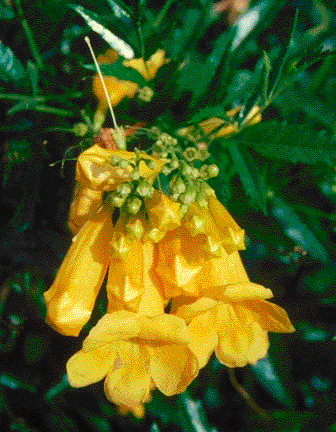

A favorite plant in the northern Chihuahuan Desert is Tecoma stans, better known to most as Yellow Bells. The bright yellow, trumpet-shaped flowers grace many a garden, to say nothing of the nooks and crannies of our desert mountains. After a winter that is severe for the region, though, many a landscaper is chagrined to find the healthy, green shrub of last year's summer naught but a cluster of dead sticks. But relax. New growth from the plant's base quickly replaces the loss.
Why will a plant grow in an area where the great expense of building
its stems and leaves is a recurring item, insidiously stealing energy that could better
be spent in reproduction? The answer is, as with all organisms, what is possible is,
what is not possible is not. At whatever point conditions become unlivable, local
extinction will follow. No planning, no "what if"—the limits are set, and
none survives beyond them. Yellow Bells so far ends up with enough excess energy to sow
its seeds—the moment it does not, it's out of here!

Listen to the Audio (mp3 format) as recorded by KTEP, Public Radio for the Southwest.
Contributor: Arthur H. Harris, Laboratory for Environmental Biology, Centennial Museum, University of Texas at El Paso.
Desert Diary is a joint production of the Centennial Museum and KTEP National Public Radio at the University of Texas at El Paso.

Yellow Bells. Photograph by Wynn Anderson.